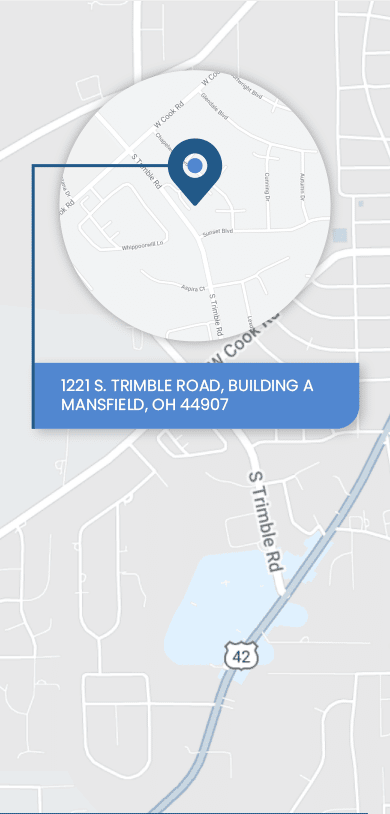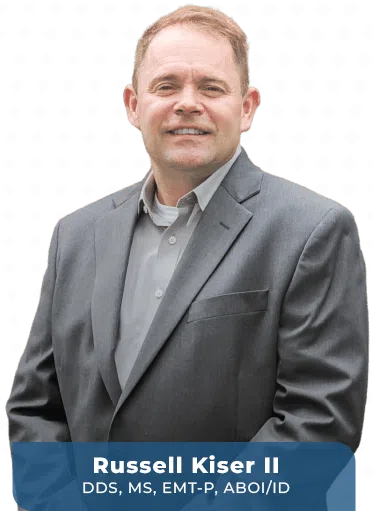Experienced Mansfield Dentist Offering Exceptional Endodontic Therapy For Over 20 Years
Discover a comfortable, caring, and experienced dentist visit with Dr. Russell Kiser’s Advanced Dentistry and Dental Implant Center. Our highly trained dentist has spent a great deal of time and effort becoming certified and skilled in many specialties including endodontics and implant surgery among other things. Whether you’re going to a Mansfield dentist for a regular check-up or something more involved like a root canal, Dr. Kiser and his office have the knowledge and experience to give top-notch advice on the best procedures and practices. With over 20 years of Endodontic experience serving over 10,000 patients, Advanced Dentistry and Dental Implant Center makes patients their priority by providing comfort and quality work in everything that they do!
Read Our Patients’ Testimonials
5- Star Rated Reviews From Our Patients
“ I’ve had nothing but a great experience with Dr. Kiser. Dr. Kiser will thoroughly explain all your dental options. I was terrified of the dentist before I started going to Dr. Kiser, but he and his wonderful staff make going to the dentist easy. All of my procedures have been pain free and now I have a smile that I love. Dr. Kiser will even call and check on you after you have had dental surgery, I have never met a dentist that has done that. I highly recommend Dr. Kiser.
Heather P. ★★★★★
“ I am so happy I found a dentist that listens and gives options. Dr. Kiser was thorough and even better is cross-trained in multiple areas and I didn’t have to go all over the place for my treatment needs. His staff was incredibly friendly and processed my insurance claims and the dental assistants are definitely professional and well trained. The office was very organized. Dr. Kiser even called me in the evening to check on me, which let me know he really cares about the outcomes of treatment he delivers. I really like how comfortable all the procedures were as I slept through the whole thing. If you go there you will not be disappointed knowing you have a dentist who takes his job very serious and practices at an advanced level. My tooth looks like a real tooth and the surgery I had done in the past went well too. Definitely go to him.
Maria F. ★★★★★
“ What a wonderful, caring, professional office. The staff was helpful with my insurance, kind, and took time to explain and answer all my questions. Dr. Kiser demonstrated a gentle, thorough, and caring approach throughout my procedure. He often stopped and asked how I was doing throughout the procedure. My comfort was his priority. Dr. Kiser even called me at home in the evening on the same day as my procedure to check on my recovering. I highly recommend Dr. Kiser only if you are looking for a respectable, caring dentist that has a staff to match! Respect and patience are two words that come to mind when I reflect upon my experience! Thank you!
Jeri B. ★★★★★
Saving Your Natural Teeth With Endodontics
A root canal is a dental procedure on the root of your tooth. The procedure may be recommended when a person has severe tooth decay, a cracked tooth, or a severe injury. Although a general dentist can do a root canal, it is usually performed by a specialist in endodontics. An endodontist is a dentist who has had additional training in surgery and treatment of the tooth’s roots. Endodontists have two or more years of additional training after earning a doctor of Dental Surgery (DDS) degree from a dental school. Their specialty is saving natural teeth. Understanding root canals, what the procedure is, and when they are needed helps a dental patient feel more comfortable about the procedure.
When Root Canals Are Needed
A person may need a root canal when a tooth has serious to severe decay or damage. A cavity that has reached the pulp of the tooth could lead to inflammation, pain, and infection. That infection could spread to the gum tissue and jaw bone without treatment. The root canal procedure removes the inflamed pulp, fills the tooth’s root, treats any infection, and restores optimal health to the tooth. An injury may also necessitate a root canal procedure. A tooth that experienced a direct hit or impact may crack or chip, exposing the root. Trauma even without a crack or chip could injure the tooth’s pulp. Performing a root canal saves the tooth and eliminates the pain caused by irritation of the tooth’s nerve. The tooth can remain healthy because the surrounding gum tissue nourishes it.


How A Root Canal Procedure Works
The news that a root canal needed to be used is a most unwelcome bit of information. While the procedures of 20 or 30 years ago used to require several visits and a considerable amount of patient discomfort, today’s root canal procedures are quick, efficient, and pain-free. The root canal procedure is straightforward and has just a few simple steps. To begin, the endodontist uses a local anesthetic to numb the area. If a patient requests sedation, the intravenous line is started about 15 minutes before starting the tooth surgery. Once the area around the tooth is numb, the endodontist uses a small tooth drill to access the pulp. Tiny dental instruments are inserted into the tooth. The pulp and nerve are removed. The tooth’s root is cleaned and disinfected. The endodontist inserts a rubbery material called gutta-percha into the tooth’s root. If the tooth has more than one root, this is repeated for each root. The tooth is sealed shut. In most cases, a temporary crown is placed on the tooth in order to protect it.
Restoring The Tooth After A Root Canal
Many teeth that have had a root canal procedure need a crown. This is the case if the tooth had severe decay or a crack that damaged its enamel and dentin structure. The crown restores the tooth’s weakened structure. Crowns are custom-made for the patient using impressions taken by the endodontist or dentist. The crown may be made of a gold alloy, porcelain fused to gold, or a composite material of resin and porcelain. The crown fits over what remains of the natural tooth’s structure.
During the root canal procedure, the endodontist numbs the quadrant of the mouth where the affected tooth is located. Most patients do not feel anything. A few patients will just feel some pressure or a slight pulling sensation. The numbness lasts for 30 to 60 minutes after the work is done. The root canal procedure removes the nerve from the tooth’s root. There will be no pain from the tooth. With a temporary crown, patients should avoid very hot, crunchy, chewy or sticky foods. Once the custom-made crown is ready, the patient returns to the office to have it cemented in place. The dentist checks the fit of the crown, and small adjustments can be made in order to ensure a comfortable fit. Root canals are highly effective, and more than 95 percent of people have a successful procedure.
When a person needs root canals Mansfield OH, Dr. Russell Kiser is the natural choice. He is a certified EMS provider and is trained in conscious intravenous sedation dentistry. As both a general dentist and an endodontist, he is adept at the care of the tooth’s roots and saving natural teeth. Make an appointment today or call the office of Dr. Russell Kiser to learn more about root canals in Mansfield OH.

Accessible Root Canal Treatment In Mansfield At An Affordable Price
We Accept Most Major Dental Insurance Plans
Root canals can be expensive and Dr. Kiser wants to ensure accessibility to as many patients as possible which is why we accept most major dental insurance plans! We are committed to providing exceptional service from the start and provide affordable services, discounts, and payment plans.




Get More Information On Root Canal Therapy
Or Book An Appointment With Dr. Kiser
Why Choose Us
Over Other Endodontic Professionals?
Your Mansfield endodontic professionals at Advanced Dentistry are committed to providing you with the most comfortable and quality procedures possible. Dr. Kiser stands out as a friendly dentist who specializes in many things from implants to root canals ensuring a one-stop shop for all your dentist needs! This along with 5-star reviews from his thousands of patients makes him Mansfield’s trusted go-to endodontic professional!

What Are The Benefits Of Undergoing Endodontic Treatment?
Save Your Teeth & Relieve Dental Pain With Root Canal Therapy

Visit Our Mansfield Dental Office Today!
Monday – Thursday
06:00 AM – 02:00 PM






















